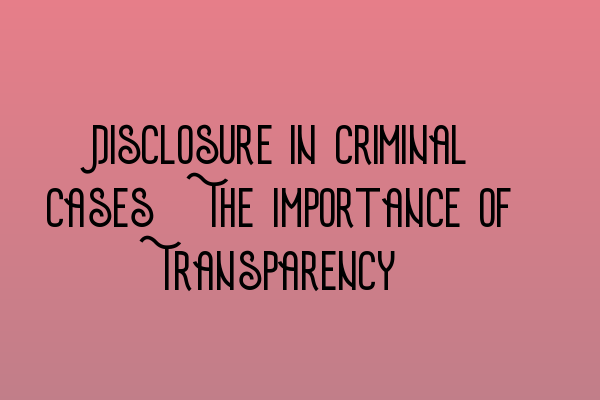Disclosure in Criminal Cases: The Importance of Transparency
As expert solicitors in criminal law and practice at SQE Criminal Law & Practice Law UK, we understand the crucial role that disclosure plays in criminal cases. In this blog post, we will explore the significance of transparency in the disclosure process and why it is of utmost importance for a fair and just legal system.
Understanding Disclosure
Disclosure refers to the process through which both the prosecution and defence exchange information relevant to a criminal case. It enables each party to have access to all the evidence, ensuring a fair trial and the opportunity to present their case effectively. Without proper disclosure, the balance of power in the legal system could be compromised, leading to unjust outcomes.
The Role of Transparency
Transparency is a cornerstone of the legal system, ensuring equal access to information and allowing all parties to make informed decisions. In criminal cases, transparency is particularly critical. It helps prevent miscarriages of justice and upholds the principle of innocent until proven guilty.
By promoting transparency in the disclosure process, we can safeguard the rights of the accused, protect against wrongful convictions, and maintain public trust in the criminal justice system.
Why Transparency is Crucial
Transparency in the disclosure process serves several important functions:
- Promotes fairness: By providing full and timely disclosure, all parties are equipped to present their cases adequately, ensuring a fair trial.
- Protects the rights of the accused: Access to all the evidence allows the defence to challenge the prosecution’s case and mount an effective defense.
- Prevents wrongful convictions: Full disclosure enables the defence to identify any weaknesses or inconsistencies in the prosecution’s evidence, reducing the likelihood of wrongful convictions.
- Strengthens public trust: When the disclosure process is transparent, it demonstrates the commitment to upholding the principles of justice and ensures the integrity of the criminal justice system.
The Challenges of Disclosure
While transparency is essential, there can be challenges in the disclosure process. These challenges include:
- Lack of resources: Limited resources can impact the timely and comprehensive exchange of information between the prosecution and defence.
- Complex cases: In complex cases with voluminous evidence, it can be challenging to manage and disclose all the information effectively.
- Confidentiality concerns: Some evidence may be sensitive or confidential, requiring careful consideration when disclosing.
To address these challenges, it is vital for legal professionals, such as our team at SQE Criminal Law & Practice Law UK, to uphold the highest standards of professionalism and commitment to transparency.
The Way Forward
To ensure transparency in the disclosure process, continuous improvement is necessary. The legal community, including solicitors, writers, and SEO experts, must work together to promote:
- Education and training: Providing comprehensive training to legal professionals about the importance of disclosure and the best practices for managing and exchanging information.
- Technology advancements: Embracing technological solutions that aid in the efficient and secure exchange of electronic evidence.
- Collaboration and sharing of knowledge: Facilitating collaboration among legal professionals to share insights and experiences related to disclosure.
By prioritizing transparency and addressing the challenges, we can strive towards a criminal justice system that upholds the principles of fairness and protects the rights of all individuals involved.
If you have any questions about disclosure in criminal cases or need legal assistance, please don’t hesitate to contact us. Our team of expert solicitors in criminal law and practice is here to help.
Related Articles:
- SQE 1 Practice Exam Questions
- SQE 1 Practice Mocks FLK1 FLK2
- SQE 2 Preparation Courses
- SQE 1 Preparation Courses
- SRA SQE Exam Dates
